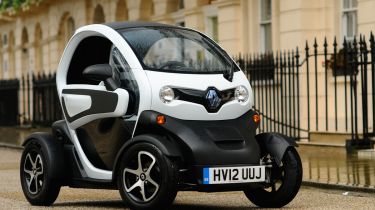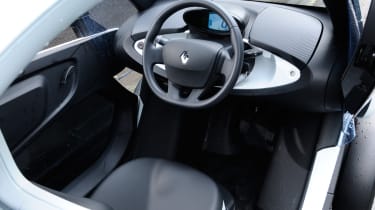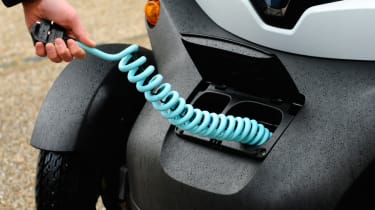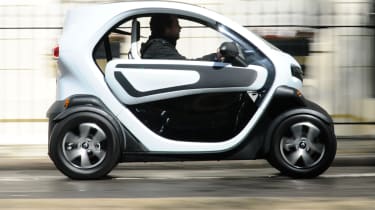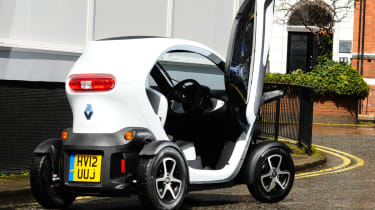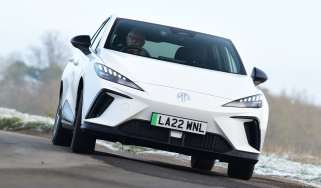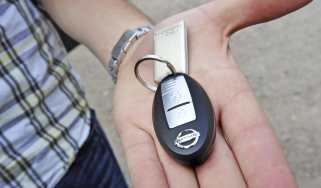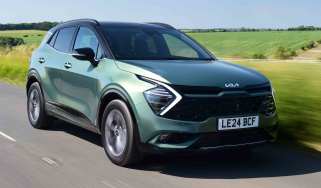Renault Twizy (2012-2021) review
The Renault Twizy is an expensive, quirky, extroverted and somewhat impractical way to show your green credentials

The Twizy is a small electric runabout that carries two people in its open-sided passenger cell, and it looks more like a vehicle from a futuristic science fiction movie than something you can buy in a showroom today.
If you're attracted by its quirky looks and green credentials, and maybe need a safer option than an e-scooter to get you to the station, or perhaps navigate a short urban commute, then the Twizy might fit the bill. However, starting from almost £12,000, it is pretty expensive, and some might say a little indulgent for something that is so limited in its capability.
About the Renault Twizy
The Renault Twizy is unlike anything else on the market from a mainstream car maker today, and was developed as part of Renault’s brave but possibly over-ambitious attempt to convert Europe’s motoring public to the joys of electric motoring.
It’s the cheapest and smallest model in Renault’s electric car range, and sits below the ZOE electric supermini. It really is small too, at just 2.33-metres nose-to-tail, and 1.23-metres across. The Twizy is classed as a quadricycle – a cross between a motorbike and a car – and the passenger sits tandem behind the driver.
There are now two versions available - Expression and Dynamique, with the single seater Cargo variant no longer available. The Expression is the starter model, and the Twizy’s minimalist charm is illustrated by the spec highlights which include an instrument panel with speedo, lockable 31-litre storage compartment behind the seats, an electric windscreen demister and grey plastic wheel trims. The Dynamique adds floor mats, a choice of 20 colours and 13-inch alloy wheels, while the Twizy Cargo was designed for commerce with a load area instead of a rear passenger seat.
More reviews
Car group tests
In-depth reviews
Long-term tests
- Renault Twizy: Final report
- Renault Twizy: Fourth report
- Renault Twizy: Third report
- Renault Twizy: Second report
- Renault Twizy: First report
Road tests
All variants feature sides that are open to the elements, but optional scissor doors and zip-on windows provide some protection, while the lockable cubbyhole designed to take a briefcase serves as the ‘boot’.
Previously, you had to pay a monthly charge to lease the battery for the Twizy, but Renault now includes that cost in the list price - which starts from a not inconsiderable £11,995, and starts to push into city car territory, with options such as the Volkswagen up!, Peugeot 108 and Citroen C1 all within reach and offering more practicality, such as doors. But, maybe that's missing the point of the Twizy.
More off-putting to potential customers perhaps, is the increasing diversity of ‘proper’ electric cars that have become available since the Twizy was launched, offering four seats and the level of comfort that passengers expect. The Twizy doesn’t really stack up as a motorcycle or scooter rival either, because it’s far more expensive and its size means it can’t squeeze through city traffic safely like a two-wheeler.
That said, there’s undoubtedly an element of fun to be had behind the wheel of the Twizy, but you’ll need to be the type of person who enjoys making people point and stare if you’re going to dive in.
Engines, performance and drive
The Renault Twizy couldn’t be easier to drive: just hit the Drive button on the dash, press the throttle and you pull away in silence. The gearbox is operated via push buttons on the dash, and the handbrake is activated by a lever underneath the steering column.
As it carries most of its kerbweight low down between the wheels, the Twizy offers plenty of grip and hardly any body roll, thanks to its stiff suspension. But the firm set-up means the ride is uncomfortable, with even the smallest bumps leading to shudders through the cabin. Big bumps can send you flying out of the seat, while the whining electric drivetrain and constant buffeting mean the Twizy can very quickly become tiresome to drive.
Engines
The Twizy is powered a 17bhp electric motor that produces 57Nm of torque, ensuring nippy performance around town and a top speed of 50mph. It can be fully charged in three and a half hours from a domestic power socket and provides up to 62 miles of emission-free driving.
MPG, CO2 and Running Costs
As the Twizy is classed as a quadricycle, it doesn’t qualify for the Government’s electric car grant, so prices start from £11,995, with the Dynamique at £12,695. You no longer have to lease the Twizy's battery, which used to cost around £49 based on a 36 month, 6,000-mile per year agreement.
However, the Twizy’s trump card is that it should be cheap to run. Renault says that its lithium-ion batteries can be recharged via a household socket for about £1. This takes three and a half hours, and should give the car a range of up to 62 miles (although, we found that 50 miles is more realistic). Plus, as it creates zero tailpipe emissions, it’s exempt from road tax and London emission zone charges. If you’re able to push the budget a bit further, the Smart ForTwo Electric Drive is a more practical proposition being faster, more comfortable and with a 90-mile range.
Insurance groups
The Renault Twizy falls into insurance group 11, which is surprisingly high, considering entry-level Ford Fiesta versions start from group 4. The Twizy's obvious lack of safety kit may contribute to this rating.
Depreciation
Electric cars don’t perform well at resale time as a rule, and the Twizy is no exception. Be prepared to lose a significantly larger chunk of cash than if you’d bought a city car.
Interior, design and technology
Any electric car will turn heads, but not even a supercar can attract attention quite like the Renault – it looks like nothing else on the road. The scissor doors – a £545 option - provide real drama, but they’re only half the usual height and they’re the only barrier between you and the elements. In colder weather, you’ll need to wear a jacket and gloves, and you'll have to resign yourself to the fact that you might get wet when it rains. The driver sits ahead of their passenger in a tandem layout, so there's not much room in the back.
A simple display screen shows the car’s speed and battery range, while the rubber and plastics are weatherproof not plush. There are three trim levels to choose from. Entry-level Expression comes with 13-inch wheels, a heated windscreen, a lockable glovebox, an onboard computer and a three-metre-long charging cable. Dynamique trim offers different colour combinations - including Diamond Black, Snow White, Flame Orange and Lagoon Blue, along with 13-inch colour-matched alloy wheels.
The now discontinued Cargo versions essentially provided the same specification as the base Dynamique, but with transformation of the rear passenger space into a storage area. Optional extras include zip-on plastic windows for £295.
Sat-nav, stereo and infotainment
There’s no sat-nav or stereo option with the Twizy, but you can get a full Bluetooth set-up at extra cost.
Practicality, comfort and boot space
The Twizy isn’t as practical as the latest city cars, but then Renault would argue this isn’t a fair comparison because it’s around half the size. Its tiny dimensions make it perfect for driving around and parking in town, while the 6.8-metre turning circle gives the Renault black cab-rivalling U-turn ability. However, despite its narrow stance, the Twizy is still too big to drive between rows of stationary cars.
Size
At 2,338mm long and 1,237mm wide the Twizy takes up a lot more space than a scooter, but it’s a good 40cm shorter than a Smart ForTwo. And as it’s so narrow, Renault reckons you could slot three Twizys crossways into a regular parking space.
Leg room, head room & passenger space
The driver’s seat slides back and forth, but doesn’t adjust for height, while the tiny passenger seat is really only suitable for children. In fact, buyers can specify an optional child booster seat, as well as storage nets and a passenger blanket. But that’s where the creature comforts end - if you want a heater, look elsewhere.
Boot
There’s just 31 litres of luggage space, plus two gloveboxes (one of which is lockable) up front, although that’s more than scooter owners have to play with.
Reliability and Safety
The Renault Twizy’s crash test results can’t be compared with regular passenger car results, as independent tester Euro NCAP’s new quadricycle programme is measured against different parameters. Euro NCAP hasn’t been flattering about the crash performance of any vehicles in the class, but at least the Twizy scores relatively highly for occupant safety in its segment with a (still poor) 39 per cent rating.
However, the Twizy will be much safer to drive than a scooter. Every model comes fitted with a driver’s airbag and seatbelt pre-tensioners for the driver and passenger - although you don't need to wear a seatbelt to drive it. An immobiliser is also fitted as standard, while an anti-lift alarm can be added as an option.
Reliability is still something of an unknown quantity for electric cars. There have been no reports of any major problems with the Twizy since it went on sale at the beginning of 2012, though, and the battery leasing system means that getting a replacement unit will be simple.
Renault finished 20th out of 30 manufacturers in our 2021 Driver Power customer satisfaction survey, while the Clio supermini placed 29th (out of 75) in the Best cars to own poll.
Warranty
The Twizy comes with Renault’s warranty package for up to three years - unlimited mileage during the first 24 months, followed by a further year limited to a total mileage of 60,000. The pack also includes three years roadside assistance.
Servicing
The cost of routine servicing can be managed via Renault’s Easylife service plan, setting out fixed monthly payments to cover the vehicle through the first three years or 30,000 miles of ownership.
If you're looking to buy an electric car, why not visit our sister site buyacar.co.uk for the latest deals...
